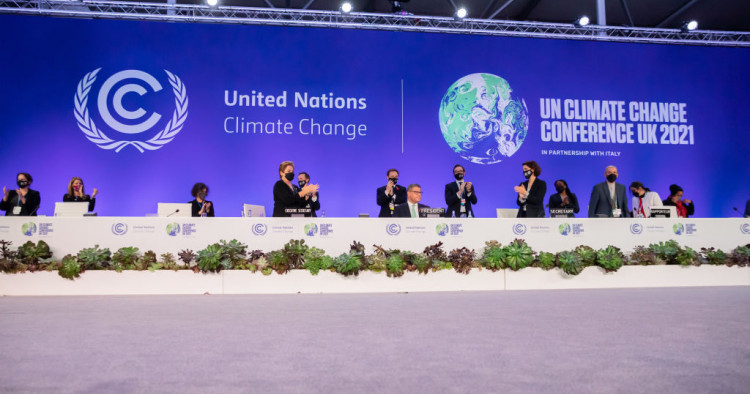Contents:
- Last-minute deal pushed through at the conclusion of COP26, but was it enough?
- Biden’s Middle East team treads water
- A gift from the Afghan Taliban to Pakistan and China
- The historic UAE-Bahrain-Israel-US joint maritime exercise in the Red Sea
- Post Paris conference, realpolitik likely to govern next steps on Libya
Last-minute deal pushed through at the conclusion of COP26, but was it enough?
Mohammed Mahmoud
Senior Fellow and Director of the Climate and Water Program

A day after the 26th United Nations Climate Change Conference (COP26) meeting formally concluded, a controversial climate compromise was reached and adopted by 197 nations/parties. Dubbed the Glasgow Climate Pact, the deal was the outcome of climate talks that ran beyond the scheduled duration of COP26. One of the primary issues that hung over the two-week meeting was the great divide between the emission reduction plans that most countries submitted and the emission reductions necessary to avert further climate catastrophe by preventing future global temperature increases from exceeding 2 degrees Celsius (as suggested by scientists and experts in the Intergovernmental Panel on Climate Change’s Sixth Assessment Report). But since nations did not come to terms among themselves on how to update their emission targets at this meeting, they were tasked under the pact to come prepared next year at COP27 with tangible plans for emission reductions that push them closer to what is necessary to limit hazardous increases in global warming.
Though lacking any specificity on timeline and process, the inclusion of language targeting fossil fuels was considered a limited success (“accelerating efforts towards the phase out of unabated coal power and inefficient fossil fuel subsidies”). That is until India pushed through, at the last minute, an amendment that changed the language from “phase out” to “phase down,” essentially turning a loose commitment on constraining fossil fuel production into a subjective interpretation. While many nations did not appreciate this change so close to the finish line, at the risk of a complete collapse of the negotiated compromise, the amendment carried through in the final version of the pact.
Based on these developments, it is hard to see the culmination of COP26 as anything beyond delaying major action to mitigate climate change until the next COP meeting. However, the small steps that the Glasgow Climate Pact put into action must be fully realized by COP27 because averting the worst projections of global warming will not be possible by delayed action at the last minute.
Biden’s Middle East team treads water
Brian Katulis
Vice President for Policy

On the eve of nuclear talks between global powers and Iran set to resume in Vienna at the end of November, U.S. President Joe Biden sent two key members of his Middle East team to the region to consult with close regional partners. Heading into the next round of Iran talks, the Biden team is starting to reassess some aspects of its initial approach to the Middle East. But a shift toward a more proactive Middle East strategy isn’t in the cards — the United States is likely to continue to tread water.
The fundamentals of Biden’s strategic approach to the Middle East are likely to remain in place: sticking to more modest goals, putting an emphasis on diplomacy, and safeguarding against becoming overextended in the region. It will also seek to lean on regional partners more heavily than in the past.
In his opening months in office, the center of gravity for Biden’s first year was at home, addressing the COVID-19 pandemic and an economic crisis. On foreign policy, Biden’s priorities centered on three C’s: climate, China, and COVID-19’s international dimension. On the Middle East, President Biden outlined some topline themes for his Middle East approach at the outset — he appointed a special envoy on Yemen, reaffirmed his campaign pledge to engage in diplomacy with Iran on the nuclear issue, and announced his administration would “recalibrate” bilateral ties with Saudi Arabia.
On each of these Middle East files, the Biden team did not yet get the results it had hoped for. It is now facing some tough realities and making tactical adjustments. The Yemen conflict continues to rage, the signals Iran has sent in advance of the next round of talks are not encouraging, and the Biden administration is engaging Saudi Arabia and other countries across the region in a series of efforts to help enhance regional stability and deter destabilizing actions.
Last week, Biden’s national security advisor, Jake Sullivan, said that the United States would continue to seek to bring Iran’s nuclear program “into a box” through diplomacy. Sullivan also emphasized the need for a combination of “deterrence, diplomacy, and de-escalation.” Look for more action on the deterrence front along with continued efforts on the diplomacy and de-escalation fronts.
Recent joint military exercises between the United States, Israel, the UAE, and Bahrain in the Red Sea and a joint air military exercise over maritime chokepoints in the region may be a preview of coming efforts aimed at sending a message to Iran about its destabilizing actions in the region. The Biden team also may be dusting off security cooperation elements of the 2013 speech that then-U.S. Secretary of Defense Chuck Hagel delivered in Bahrain in an effort to reassure regional security partners.
In addition to the regional security coordination, expect the Biden administration to work to deepen the dialogue it began with Gulf Cooperation Council states in a September meeting between Secretary of State Tony Blinken and his counterparts on the edges of the United Nations General Assembly. It will continue to encourage countries such as Saudi Arabia and the UAE to engage Iran directly in diplomacy.
But a strategic shift in U.S. Middle East policy is unlikely for the time being, unless there is progress on the Iran talks or some other unexpected event in the region. The botched Afghanistan withdrawal damaged Biden’s political standing at home and undermined the confidence of U.S. partners around the world. Many on the Biden team know damage was done, and there is little appetite on the team for leaning into complicated challenges like the Middle East.
If you hear U.S. officials working on Middle East policy talk these days, they tend to use vague process-oriented phrases to describe the current U.S. approach to the region, like “pragmatic engagement.” This seeks to avoid setting expectations too high about possible U.S. action, given all that it has on its plate at home and abroad.
But there’s a potential weakness with just treading water in the Middle East today: In a turbulent region, the seas can get rough and waves can swell up at a moment’s notice, making it all but impossible to keep afloat.
Follow on Twitter: @Katulis
A gift from the Afghan Taliban to Pakistan and China
Shanthie Mariet D'Souza
Non-resident Scholar

Ever since it captured power in Kabul on Aug. 15, the Afghan Taliban’s Islamic Emirate has desperately tried to assuage the concerns of regional countries and the international community that Afghanistan could once again become a hotbed of terrorism. The Taliban’s intent to rein in their former allies like al-Qaeda has been questioned, so too has their capacity to deal with the spike in violence carried out by the Islamic State-Khorasan Province (ISKP). Amid such negative publicity, the month-long cease-fire agreement between the Pakistani government and the Tehreek-e-Taliban Pakistan (TTP) announced on Nov. 8 and taking effect on Nov. 9 can be seen as a sort of offer of proof by the Taliban that they indeed wish to portray themselves as harbingers of peace rather than a source of instability. The real story, however, is that of their selective approach toward terrorism.
A day before the announcement of the cease-fire agreement, Tolo News reported about a two-week-long negotiation between Islamabad and the TTP in Afghanistan’s eastern province of Khost. Afghan Minister of Interior Sirajuddin Haqqani of the Haqqani Network played host to both sides. The confirmation of the Islamic Emirate’s role was provided by its foreign minister, Amir Khan Muttaqi, on Nov. 14.
While the Islamic Emirate would like the world to believe that it has transformed into a peace envoy, the “cease-fire gift” merely assuages the concerns of its friends: Pakistan and China. Reports from the field suggest that the Taliban have already acted to control the activities of the East Turkestan Islamic Movement (ETIM), made up mostly of Uyghurs, by relocating them from Badakhshan (with a border with China) to Nangarhar in the east. The deal with the TTP, thereby, constitutes a second gift to Beijing.
The TTP, an ally of the Afghan Taliban, has been blamed for some of the recent attacks in which Chinese nationals, including those working on China-Pakistan Economic Corridor (CPEC) projects, have been injured and killed. While Islamabad has tried to blame Indian intelligence agencies for the attacks, Beijing is unconvinced. As indicated in a report in the Chinese state-run daily The Global Times, it considers the “TTP’s enmity toward Pakistan” a risk for Chinese projects. There is understandably immense Chinese pressure on Islamabad to rein in the TTP — and quickly.
The agreement with the TTP, thereby, provides the Pakistani state with a shortcut to peace, without having to undertake a lengthy and costly military operation against a group responsible for the killing of nearly 140 school children in 2014. Not surprisingly, within Pakistan, the agreement’s intent, utility, and timing have been questioned by the media, intelligentsia, as well as the country’s Supreme Court.
An agreement made under duress — i.e. Afghan Taliban pressure — is unlikely to hold. The TTP, which had previously been weakened by sustained military operations by the Pakistani military, has resurged recently. Its demand for the release of its imprisoned cadres has not been acceded to by Islamabad, which now acknowledges that there could be 500 to 600 moderate elements within the TTP vis-à-vis an estimated 2,200 hardcore cadres. There is a precedence for the TTP’s acquiescence, however.
Previously, in 2010 and 2014, the TTP made cease-fire declarations, only to renege on them afterwards. There is little reason to believe that the same will not happen again. On Nov. 13, five security force personnel were killed in three attacks by unidentified militants in areas along the Pakistan-Afghanistan border where the TTP operates. More importantly, inside Pakistan there remain serious concerns that the Taliban’s victory in Afghanistan could embolden the TTP domestically, leading to a serious security issue for Pakistan.
The bigger question, however, is about the Islamic Emirate’s overall approach to global and regional terrorism: Will the Taliban break their lingering ties with al-Qaeda and regional anti-Indian groups like Lashkar-e-Taiba and Jaish-e-Mohammad? Their further commitment to a terror-free region and world will be tested against those benchmarks.
Follow on Twitter: @shanmariet
The historic UAE-Bahrain-Israel-US joint maritime exercise in the Red Sea
Kevin Donegan
Distinguished Senior Fellow on National Security

On Nov. 15, U.S. Naval Forces Central Command (NAVCENT) is wrapping up a five-day joint maritime security operations exercise in the Red Sea with Bahrain and the UAE that for the first time included Israel. This is much more than a simple signal to Iran or a response solely to the July 2021 Mercer Street attack that the U.S. attributed to it.
Instead, this is the leading edge of a fundamental change in defense cooperation in the Middle East — one that will require continued U.S. leadership if it is to be successful.
What makes this exercise different is that it comes on the heels of the foreign ministers of Israel and Bahrain visiting the 5th Fleet commander on a U.S. warship pierside in Bahrain that was made possible by the Abraham Accords. For the first time this is about real defense cooperation that can significantly enhance the region’s defensive posture relative to Iran.
Why now? Like all things in the Middle East, this is multifaceted; however, at the center are the Abraham Accords, which opened the door for normalization between the Arab signatories and Israel. Success on the cultural, tourism, and economic fronts has been ongoing for a year. Now, on the defense side, this presents the opportunity to bring Israeli technology and experience in integrated air defense to Arab nations that are living directly under the threat of Iran’s growing missile and lethal drone capability.
What next? On Nov. 13, Central Command’s (CENTCOM) air component commander, Lt. Gen. Gregory Guillot, said that the U.S. could hold a joint air exercise with the UAE, Bahrain, and Israel to follow up on this maritime exercise.
The next step could be Saudi Arabia joining the Abraham Accords. The Saudis have a lot to consider in this decision, but Iran’s hand in the constant missile and drone attacks against population centers deep into the kingdom and Saudi Arabia’s responsibility as the custodian and protector of the Two Holy Mosques could make it happen sooner than most expect.
U.S. leadership remains the most significant element. The U.S. is focused on China but our interests in stability in the Middle East remain substantial. The recent move of Israel into CENTCOM’s area of responsibility will allow leadership to incorporate it routinely into multilateral exercises and plans that will contribute to regional stability in the face of Iran’s increasing lethal destabilizing activities.
Post Paris conference, realpolitik likely to govern next steps on Libya
Jonathan M. Winer
Non-Resident Scholar

Participants in last week’s Nov. 13 international conference on Libya convened in Paris by French President Emmanuel Macron, with the participation of U.S. Vice President Kamala Harris, German Chancellor Angela Merkel, and Italian Prime Minister Mario Draghi, again committed themselves to the U.N. road-map for Libya of elections, the end to foreign interference, and the withdrawal of foreign military forces and mercenaries.
But Turkey and Russia sent lower-level emissaries. Meanwhile, Turkey expressly reserved its right to stay in the country, on the grounds that unlike the Russian forces that participated in attacking Tripoli, its fighter were defending the internationally recognized government. This week, members of Libya’s 5+5 Joint Military Commission (JMC) have quietly planned to meet in Cairo with Turkish and Russian counterparts to discuss next steps in getting foreign fighters and mercenaries to leave Libya, following initial departures promised by the Russian side. Concrete departures of more foreigners would have far greater consequences on the ground than all the salutary words expressed in Paris.
Meanwhile, Libyan leaders continue to position themselves to block the path to any election results they see as contrary to their interests. Rather than follow the U.N. plan, Libyan Speaker of the House of Representatives Aguila Saleh limited the Dec. 24 elections to cover only a first round of presidential voting, not one for president and parliament, so that no one can become president without receiving more than 50% of the total vote — an improbability for anyone amid a multi-candidate field.
Current plans are for the second presidential round not to occur until some six weeks after Dec. 24, at the same time as parliamentary elections. This extended delay should provide ample opportunities for spoilers to disrupt the process should they not like the election results. Both Libya interim Prime Minister Abdul Hamid Dbeibah and Libya’s eastern warlord Khalifa Hifter are likely to announce soon their intentions to run for the presidency. Hifter’s candidacy has already been declared as unacceptable by the head of Libya’s legislative consultative body, the Tripoli-based State Council, who warned that Hifter’s election, given his previous effort to take Tripoli by conquest, would lead to the immediate resumption of Libya’s civil war.
As the elections go forward, internationals will have to use both carrots and sticks to discourage election losers from working to knee-cap election winners. The Libyans themselves will need to build some form of condominium government that distributes wealth and power sufficiently broadly to give a wide range of constituencies incentives to allow elections, abide by them, and then enable a new government to form.
Photo by Christoph Soeder/picture alliance via Getty Images
The Middle East Institute (MEI) is an independent, non-partisan, non-for-profit, educational organization. It does not engage in advocacy and its scholars’ opinions are their own. MEI welcomes financial donations, but retains sole editorial control over its work and its publications reflect only the authors’ views. For a listing of MEI donors, please click here.













